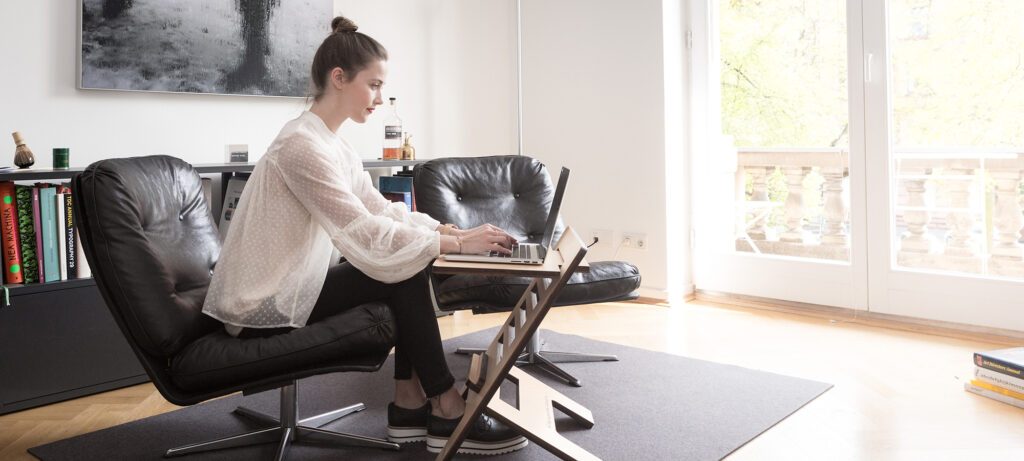
Get a free demo
Enquire about a no-obligation demo today and get an exclusive hybrid working research paper — for free. Created in partnership with YouGov, this invaluable guide provides essential insights into developing your own effective hybrid strategy. Click below.
Flexible working practices are the future
Everyone at Cloudbooking has the opportunity to embrace flexible working. Adopting flexible-working arrangements means we are more productive (as we don’t waste hours commuting), communicate better (because we need to), and, best of all — we don’t even need to get dressed in the morning.
Who doesn’t want a life like that? New research by TV and mobile provider TalkTalk shows that flexible working is the future. The company has teamed up with productivity expert and author of Time Management for Dummies, Clare Evans, to help people who work from home make the most of their freedom from the office. She believes the different ways of working can benefit both employer and employee and that the benefits of flexible working are there for all to see when properly managed.
Clare says: “Although it may seem that some home workers cut corners, the beauty of flexible working is that it allows us to fit work around the things in your life that matter. Everyone works in different ways, and if you’re more productive doing your spreadsheets between the bedsheets, that’s fine.”
Here at Cloudbooking, we couldn’t agree more. TalkTalk itself is big on giving employees the choice of how they work. It has embraced what it calls “next-generation ways of working,” and it wants to give employees a real say about how, when, and where they work — and all the tools they need to do it. That could mean working from any of the company’s sites across the UK, in their own home, or anywhere in between.
TalkTalk
Duncan Gooding, Interim MD at TalkTalk Business, says: “Whilst working routines are going to evolve further, bringing the end of Monday to Friday, this does not need to come at the expense of business growth. There has never been a better opportunity to meet employee needs for greater flexibility through leveraging technology. By understanding what is happening and helping drive the evolution of the workplace, businesses can supercharge their productivity and do more for less, faster than ever before.”
“Technology continues to increase worker productivity, helping standards of living improve as working hours have gone down. Still, as TalkTalk Business’ survey reveals, this is not a trend that today’s employees are seeing, as we are entering the Fourth Industrial Revolution. Both employers and employees need to realise that technology is there to make their working lives easier and more enjoyable. Advances in machine learning and AI enable employees to get more done in less time, helping them achieve that elusive work-life balance they hear so much about,” adds Graeme Codrington, Futurist to TalkTalk Business.
However, what other benefits are there to flexible working from home? According to the 2000 plus people surveyed by TalkTalk, here are the top 10 reasons to change your working structure.
Thursday is the new Friday — weekends start early!
Friday is the most popular day of the week to work from home, according to the survey. 33% of respondents said their weekend starts on Thursday, safe in the knowledge they don’t have to be back in the office until Monday. Mondays are the second most popular (24%) — again, extending the weekend.
When employees have the freedom to work between the office and their home, this is known as hybrid working. Hybrid working has quickly become one of the most popular workplace strategies thanks to the coronavirus pandemic, which has seen employees required to work between home and a socially-distanced office space.
Meetings in your PJs!
No one can see what you’re wearing when you work from home. So you may have a smart shirt on during that work video conference call, but you’re actually wearing PJs on your bottom half! According to the survey, those working from home tend to get dressed at 9:11 am, however, 11% admit not getting dressed until the afternoon. A further one in ten admits to staying in their underwear (or dressing gown) for most of the day.
Start later, finish early!
While you’ve spent the morning fighting your way through the commute to reach your desk for 9 am, those work-from-homers have had it easy. On average, they tend to start work at 9:28 am, according to TalkTalk.
They clock up fewer hours
Another one of the benefits of flexible working is that morning isn’t the only time where they shave time off their tally. When working from home, people only spend six hours and 14 minutes doing actual work. Retail, catering, and leisure professionals admit to working less, clocking up five hours and 14 minutes doing actual work when working from home, while HR professionals work for longest, putting in seven hours of actual work when working at home.
Catch up on the soaps and chores
When working from home, people only spend six hours 14 minutes doing actual work. Therefore, there’s more time to catch up on all your favorite shows.
Working from home also gives workers more time to get minor household chores like laundry, washing up, and even meal prepping done during those hours they would normally be out of the house.
They avoid the busy office
People pick and choose when to be off to relax more. It’s often hard to get your head down and work on a tough job when everyone around you is mucking about, your boss is door-stopping you at your desk, and the phones are ringing off the hook. But for those working from home, it’s not a problem. Almost a quarter time their day from home to coincide with when it’s busiest at work.
Flexible working arrangements like agile working and hybrid working have enabled workers to more effectively social distance as companies bring workers back into the office environment. Flexible working can not only help improve productivity and employee satisfaction but also help ensure a safe and healthy workforce.
Office, what office?
Working from home often means working from bed, according to TalkTalk.
For 21% of those who work from home, their bed is their “desk.” And of those working in arts and culture, 28% confess to working from their bed.
Forget lunchtime, what about nap time?
Sleeping at your desk will, at worst, get you fired and, at the very least, see you humiliated on social media. No such fears for those who work flexibly from home, though. Over one in ten (14%) have taken a nap, with 5% timing emails to send, so it looked like they were working, according to the survey.
Sale shopping is working, right?
Have you ever been caught online shopping instead of working? Well, those who work from home don’t have to fear this. An industrious 27% have shopped online instead of doing work, while 54% have received a delivery, and 34% have carried out housework.
When that video is too good not to share!
Admit it — we all love a cute animal GIF — who doesn’t? Here at Cloudbooking, we often share funny videos and clips to keep each other entertained. But we’re not the only ones. One in 10 people admit to spending their days at home searching YouTube for clips of cute cats and dogs, according to TalkTalk.
So there you have it. Although you will probably find your own thing you love about flexible working, it is safe to say the benefits outweigh the negatives, and this workplace strategy looks to be here to stay. Implementing flexible working practices such as hybrid and agile working may pose many challenges to employers, but with the help of software technology like Cloudbooking, you can support this period of adaptation.


